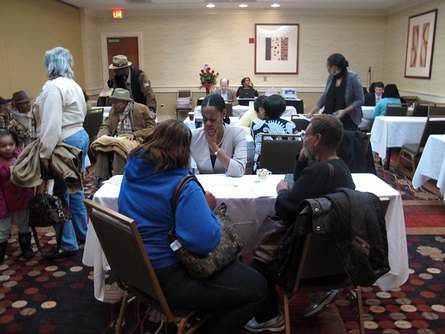
BLACK FARMERS and their relatives file claims applications in Memphis, Tenn. A settlement in a discrimination lawsuit pays farmers who were denied loans from 1981 to 1996. (ADRIAN SAINZ | ASSOCIATED PRESS PHOTOS), a photo by Pan-African News Wire File Photos on Flickr.
Discrimination lawsuit brought praise, scorn
Pires' actions on $1B case drew ire from judge
2:21 PM, Aug 5, 2012
Senate candidate's breakthrough case as lawyer: Senate candidate's breakthrough case as lawyer
Written by Jonathan Starkey
The News Journal
U.S. Senate candidate Alex Pires is famous for suing the U.S. Department of Agriculture on behalf of black farmers who said they had suffered discrimination.
Independent Pires takes aim at shaking up D.C.
In April 1999, the U.S. Department of Agriculture settled a landmark discrimination lawsuit brought by Timothy Pigford, a black corn and soybean farmer from North Carolina.
Thousands of southern black farmers who claimed they were unfairly denied government loans because of their race would collect $50,000 checks from the settlement, which cost the U.S. government more than $1 billion in payouts. For a time, the Pigford case was thought to be the single largest federal civil rights settlement on record.
The shrewd, combative class action lawyer behind that settlement was Alex Pires , the Dewey Beach bar owner who has captured the attention of Delaware politicians in recent weeks as an aggressive Independent challenger to U.S. Sen. Tom Carper.
But the Pigford case has been a boon and a bane for Pires, who earned a name for himself as a successful lawyer by securing the large settlement, but also became the target of widespread criticism. Paul L. Friedman, the federal district court judge in Washington who presided over the case, once accused Pires’ team of lawyers of conduct bordering on “legal malpractice” and called his performance on the case “dismal” after Pires repeatedly missed deadlines to submit farmers’ claims for review.
Several of Pires’ own clients later attempted to throw out the settlement and have Pires tossed off the case. He and fellow lawyers were later fined $308,000 by the court, but remained on the case.
During a recent interview, Pires called his time leading the Pigford lawsuit, and a later class action case brought by farmers against the major tobacco companies, the most “interesting” and “intellectually challenging” projects of his career. He dismisses criticisms as an unavoidable professional hazard.
“My style is unique,” said Pires, “and it works. It is true that I don’t get along with judges ... they want me to litigate in the traditional manner, which I will not do, thus the harsh words between us. So be it. Clients seek me out because I win.”
Huge lawsuit
In April 1997, Timothy Pigford and several other farmers approached Phillip Fraas, who had worked as lawyer for Senate and House agriculture committees, about filing a discrimination case. Fraas took the case to Pires, a former colleague. “We worked well together,” said Fraas, who called Pires a “darned effective litigator. The results turned out to be everything we had hoped for and more.”
Pires and Fraas, as well as lawyers from southern law firms, organized meetings for black farmers to sign onto the lawsuits at gyms, restaurants and small convention centers in rural hubs in the Deep South. Fraas remembers expecting 30-50 farmers for a meeting in Arkansas and was stunned when 200 farmers showed.
After the 1999 settlement, 22,721 farmers submitted claims, and 15,645 were approved for the $50,000 payouts, according to the federal district court in Washington. Adjudicators also authorized millions in debt relief. But hope turned to disappointment for many.
Controversy follows
Some 60,000 claimants missed a filing deadline, and saw no payments. Others, like Pigford himself, were unhappy with the terms of the deal, which did not include a large lump sum in damages, but required claimants to prove they were unfairly treated.
Pires was blasted by Friedman, the judge, for failing to submit farmers settlement claims on time. On April 19, 2001, Pires made the “remarkable admission” that he “never had a realistic expectation” of meeting a deadline negotiated with government lawyers, according to court documents. It was a stinging remark for the judge and fellow lawyers.
Said Fraas: “He [Pires] probably regretted saying that. It shouldn’t have left his mouth. I think he was trying to convey something, but it came out wrong.”
Pires and other class lawyers “have earned accolades and acclaim for their efforts in initiating this case, litigating to the verge of trial, and then negotiating a truly historic settlement,” Friedman wrote. But “negligent handling in the final states of this case, however, runs the risk of jeopardizing counsel’s prior accomplishments.” Friedman said the “conduct border(ed) on legal malpractice.”
John Boyd, president of the National Black Farmers Association , said Pires deserves a wealth of credit, particularly for his work on behalf of black farmers. Boyd and others were nearly broke when they found Fraas and Pires.
“The situation with the black farmers has never been a pretty picture,” said Boyd.
“One thing I can say about Al Pires is that he did take a chance on these cases when very few others would really take a chance on these cases. I think you have to give him some credit.”
No comments:
Post a Comment